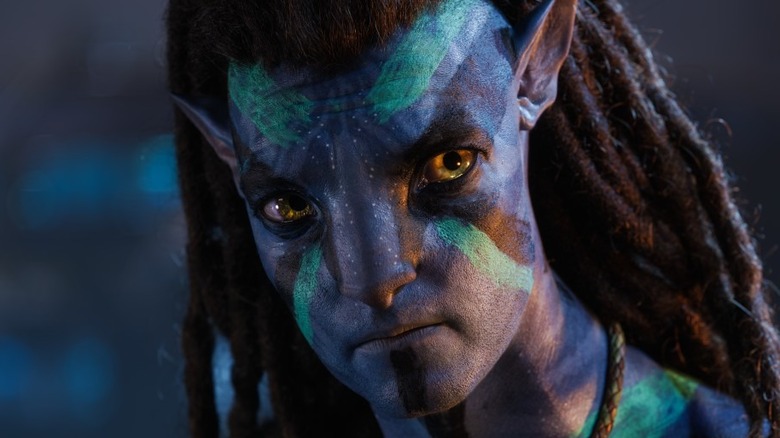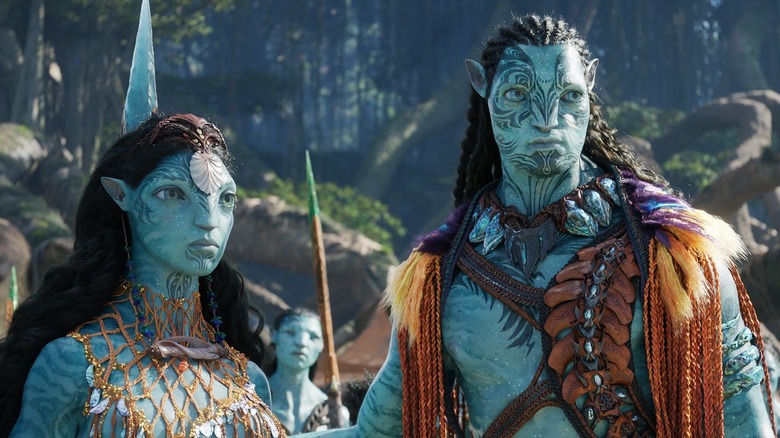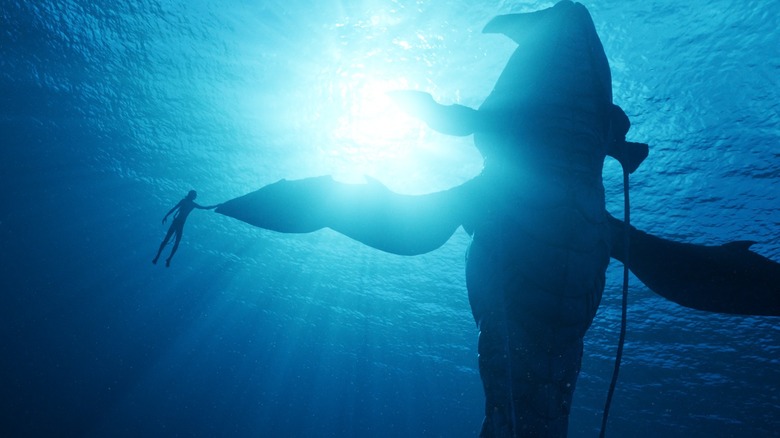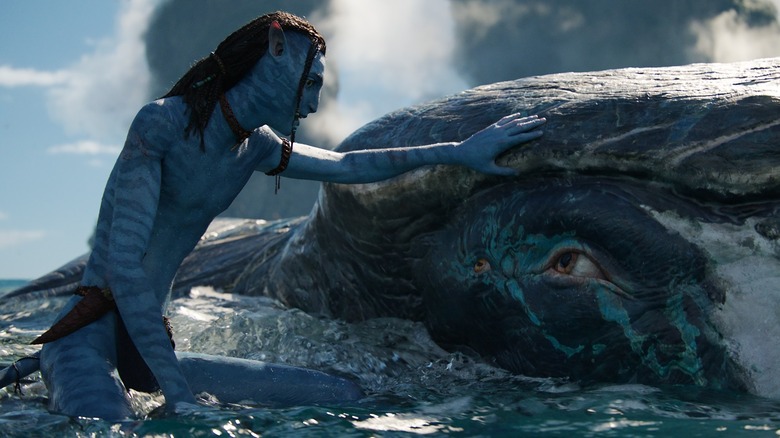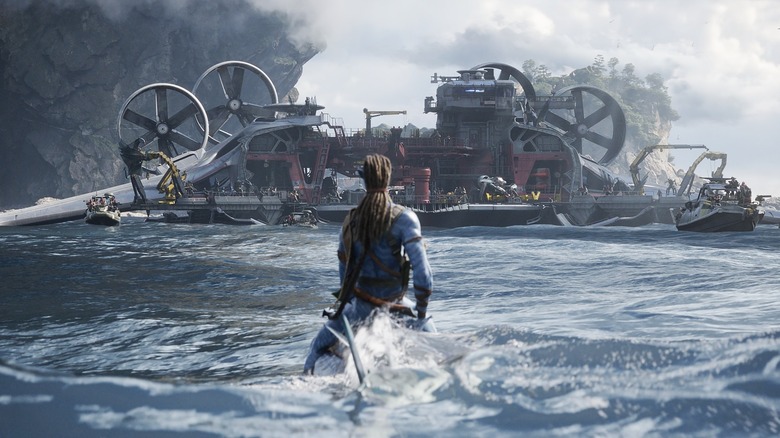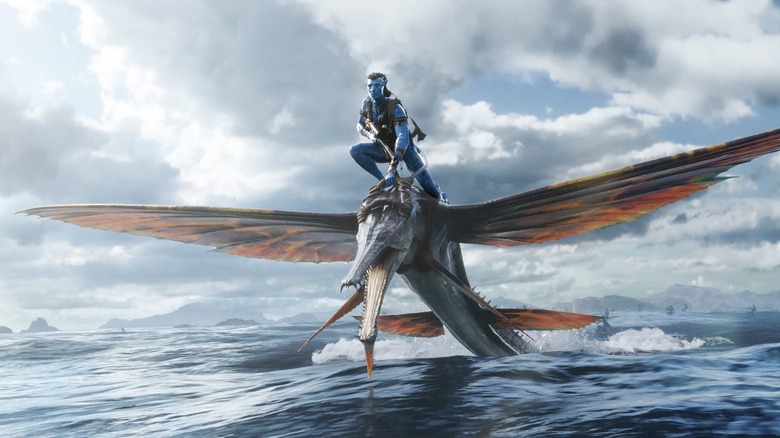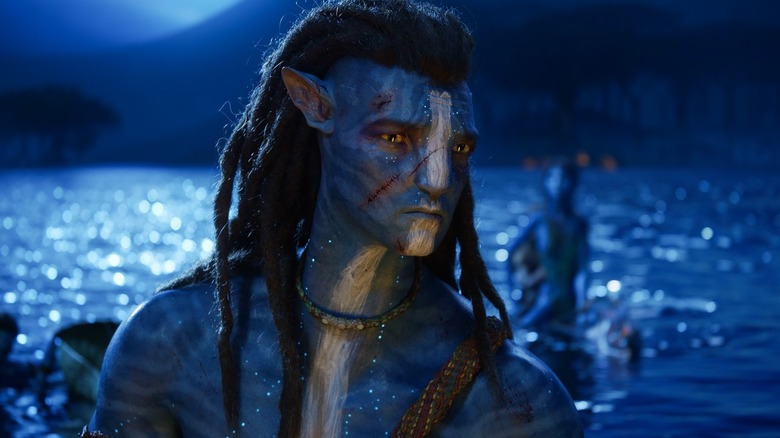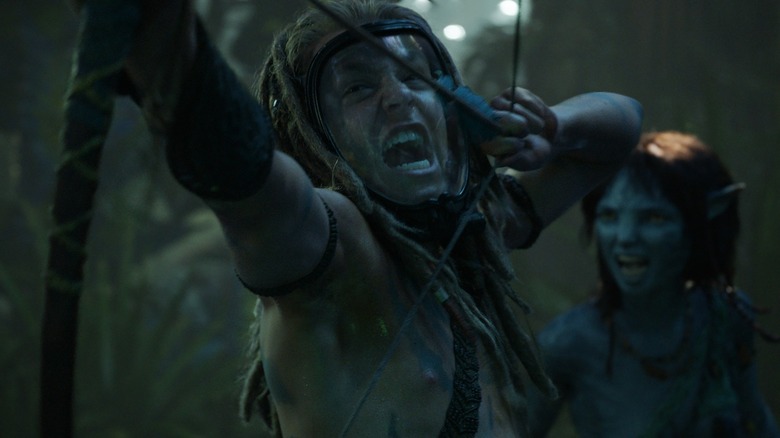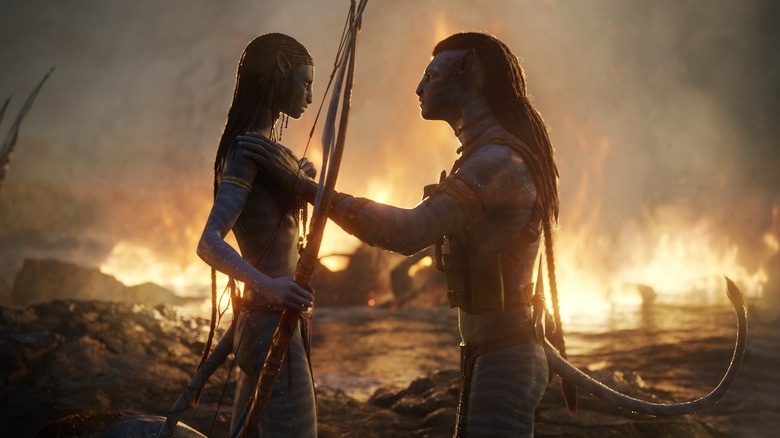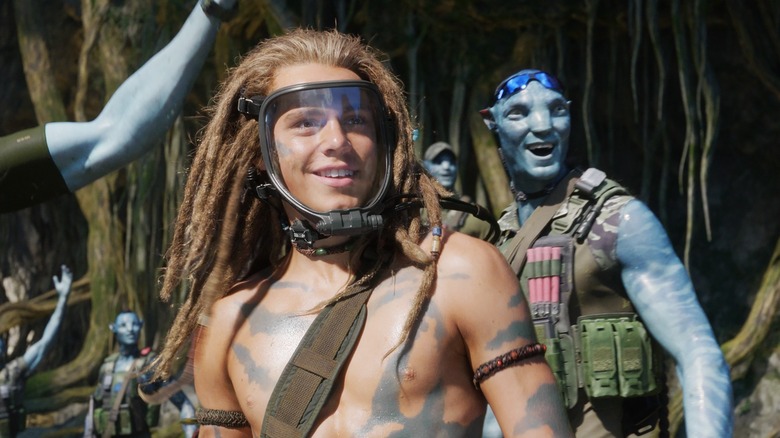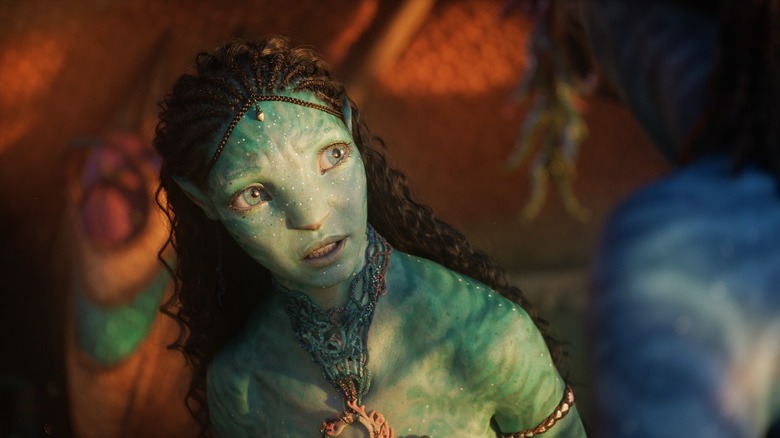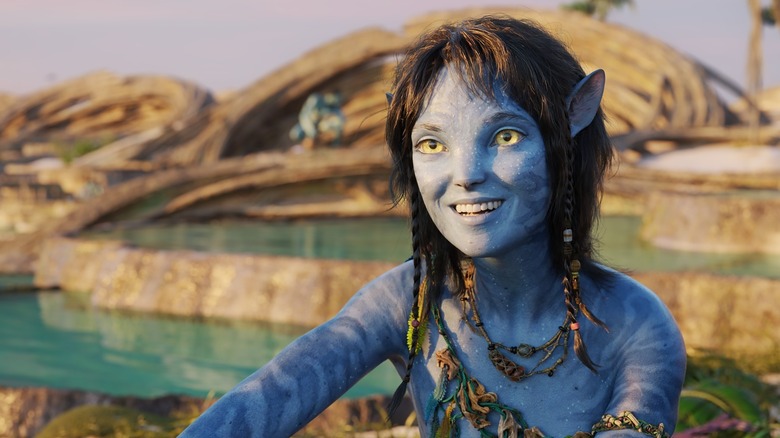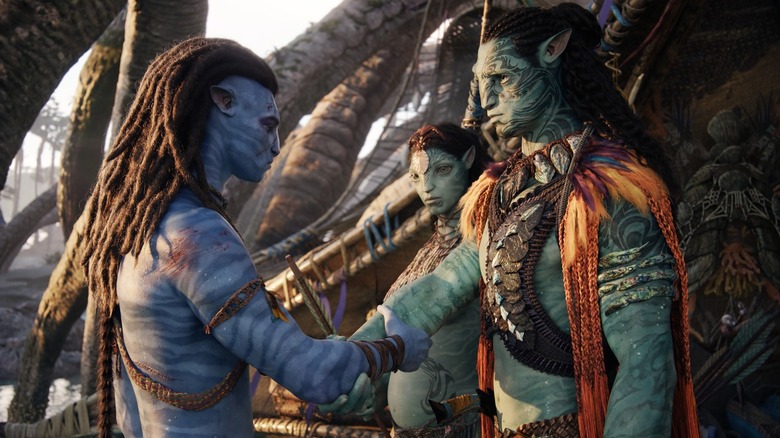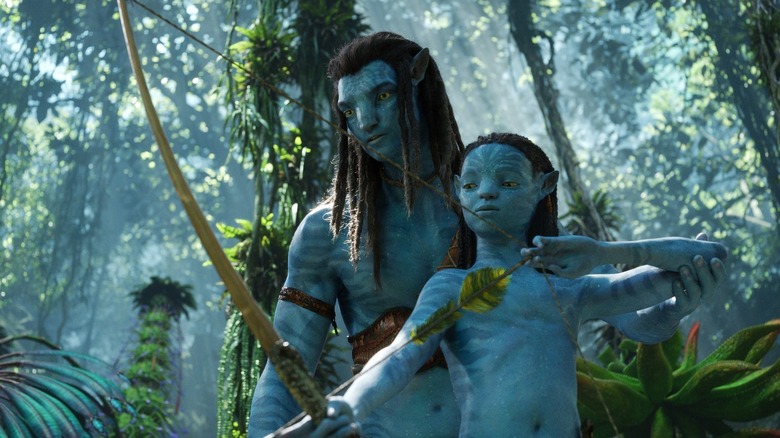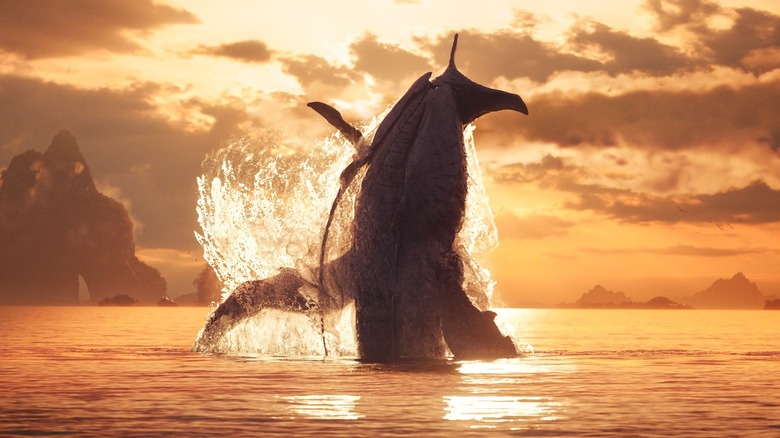The Ending Of Avatar: The Way Of Water Explained
What's a man to do after joining an indigenous alien society and destroying a human mining colony that has been slowly devastating their planet? If you're ex-marine (but still self-proclaimed jarhead) Jake Sully (Sam Worthington), you have a couple of kids, teach them how to fish, and wait for the inevitable return of the "sky people."
James Cameron's "Avatar: The Way of Water" is a much bigger movie than its record-shattering predecessor, both in terms of spectacle and emotional scope. While it struggles at times to build nuance on top of the original film's shaky foundation, it absolutely ends with a bang. Or, well, several.
Following a series of close encounters with death, Jake and his wife Neytiri (Zoe Saldaña) relocate their family to the coastal region of the Metkayina, a sect of green Na'vi who live in harmony with the sea. Their children — brothers Neteyam and Lo'ak (Jamie Flatters and Britain Dalton), young daughter Tuk (Trinity Jo-Li Bliss), and adopted daughter Kiri (Sigourney Weaver), the mysterious child of the late Dr. Grace Augustine — must learn the "way of water" and embrace the lifestyle of the Metkayina in order to survive.
Though it frequently stumbles and goes on for entirely too long, "Avatar 2" is filled with enough breathtaking visual moments to make it all worthwhile. The film's climax is particularly thrilling, both in its stunning aesthetics and its ramifications for the future of the franchise. With that in mind, here's a (spoiler-heavy) breakdown of everything you need to know about the ending of "Avatar: The Way of Water."
War comes to the Metkayina
Jake and Neytiri flee their home in order to protect their children, ultimately seeking refuge with a group of Metkayina on Pandora's reefs. However, it takes some convincing to get local leaders Ronal (Kate Winslet) and Tonowari (Cliff Curtis) to give them shelter. They claim the Metkayina aren't at war yet, and that the presence of Jake and his family will inevitably bring bloodshed to their shores. Spoiler alert: That's exactly what happens.
After Kiri has a seizure from bonding with the Metkayina's spirit tree, Norm (Joel David Moore) flies in on an RDA helicopter to help. The vessel's signal is detected by Quaritch (Stephen Lang) and his crew, who quickly set out to search the islands for Jake. They torture Na'vi, kill animals, and put whole villages to the torch, ultimately driving the Metkayina to war. The final battle ends up being a victory for the denizens of Pandora, but it comes at a heavy cost.
When Jake tells Tonowari and Ronal that he's the one the RDA is searching for, the response is hostile. They blame him for the violence threatening their shores, and they're right to do so. It's foolish of Jake to think he can outrun Quaritch, and it's even more foolish of Norm to take a chopper to them. However, it's also true that the war would have probably found the Metkayina sooner or later. The hunting of the Tulkun is becoming increasingly important to the RDA, making open conflict with the locals inevitable.
Hunting the Tulkun
"The Way of Water" spends a lot of time exploring the nature of the Tulkun — giant, whale-like creatures who ceaselessly migrate through the oceans of Pandora. Viewers learn that the Tulkun are extremely intelligent, with brains far more complex than those of humans. They're capable of music, art, mathematics, intense emotion, and high-level communication, even getting their own subtitles when chatting with their Na'vi kin. All that development makes it even more devastating as the RDA mercilessly hunts them.
In an extended action sequence, the film shows Captain Mick Scoresby (Brendan Cowell) and his team of Tulkun hunters brutally targeting and immobilizing a mother Tulkun who refuses to abandon her young calf. The humans then enter the creature's mouth and drill a hole up into its brain, extracting a viscous fluid that apparently "stops human aging." Scoresby tells Spider (Jack Champion) that a single vial of the stuff is worth "80 million," and that it's become the focal point of the RDA's operations on Pandora.
There are a few interesting details here. One, this mission seems to have nothing to do with the RDA's main goal of preparing Pandora for full colonization. Early on, General Frances Ardmore (Edie Falco) tells Quaritch that her job is now to make the planet habitable for human settlement. Yet, many of her forces are still just mining valuable resources for Earth's elite. Additionally, Scoresby's dialogue suggests that the quest for unobtainium has quieted. Perhaps that's because of the Na'vi resistance back in the forest, or perhaps it's for some other reason.
Those meddlesome kids
Quaritch decides to use the violent hunting of the Tulkun to lure out Jake, and it works. Afraid for the life of his new Tulkun friend Payakan — outcast by his clan for going against their pacifist ways — Lo'ak swims out to Three Brothers Rocks to warn him. By the time he gets there, however, Payakan has already been tagged for the hunt, and the RDA are en route.
At the end of "Avatar: The Way of Water," Jake says his family's unity is both their greatest strength and their greatest weakness. The latter proves to be true here, as all of the kids want so desperately to help each other that they all end up getting caught. They stay true to the "Sullys stick together" mantra, but that ends up putting them in the middle of harm's way.
In a way, Jake's love for his children is what ends up causing the big battle at the end. He calls in Norm because Kiri has a seizure and he desperately wants to help her, leading the RDA to him. Then, the values he's instilled in his kids cause them to get captured, and his love for them forces him to make some difficult choices.
The battle begins
With the kids captured by Quaritch and held hostage on his giant boat, "The Way of Water" enters its massive, multi-stage climax. At first, it looks like Jake is going to avoid violence. He's fully prepared to hand himself over in exchange for the safety of the children, and he encourages the Metkayina to stand down. In this moment, you can see Jake's exhaustion written on his face — his fear of what another battle could do to his family. He seems defeated before the battle even starts. But then, Payakan intervenes.
In one swift blow, the Tulkun throws the entire RDA ship into disarray, tossing its massive body across the deck and causing widespread destruction. It's the exact opening the Na'vi need, and they waste no time springing into action. Jake, Neytiri, Tonowari, and Ronal lead the charge while Payakan continues his own rampage. The Tulkun cleverly manipulates the way the humans hunt his kind, using Scoresby's explosive harpoon against him and ripping off his arm before sending the hunter to his death.
It's easy to imagine how powerful a whole herd of Tulkun could be in battle, but no others come to aid Payakan and the Na'vi. It seems that, despite the violence being committed against them, they're still dedicated to their pacifist ways. It remains to be seen how those convictions will hold up as humanity's plunder of Pandora continues. The franchise could produce some interesting conversations about the role of nonviolence in the struggle against oppression, but knowing James Cameron, the films probably won't get that deep.
Sullys stick together
As the sea battle at the end of "Avatar: The Way of Water" winds down, eclipse brings a brief nightfall, and the fighting continues in the dark. With the RDA's forces severely diminished and their equipment mostly destroyed, Neteyam goes in solo to free the younger kids from their bindings. It's a great moment for the big brother, showing both how much he's learned from his parents and how much he cares for his family.
With the kids freed, Neteyam is ready to go, but Lo'ak begs him to help rescue Spider as well. The young human spends most of the movie in the captivity of his reborn father, and Lo'ak says that it would be wrong for them to leave him there. Reluctantly, Neteyam agrees, and they manage to get Spider out as well, albeit at a serious cost.
One of the more interesting things about "Avatar 2" is the less-than-traditional family at its center. While three of the main kids are Jake and Neytiri's biological children, Kiri is adopted, and Spider isn't even Na'vi. Despite these differences, they all treat each other the same (for the most part), embracing a "no one left behind" policy for the whole clan. It's admirable and touching, but it also gets Neteyam killed.
A tragic loss
It would be miraculous for the massive Sully family to make it through the carnage in "The Way of Water" completely unscathed. As so often happens, it's the responsible older brother who ends up taking the fall. Neteyam does his best to get all the kids out safe, but he catches a stray bullet and dies soon after surrounded by his family.
This loss is brutal, especially for Neytiri. The Sullys end up going back to the ship to rescue Tuk from Quaritch's grasp, but you get the sense that Neytiri might have returned regardless to seek vengeance. The death of a firstborn child is no light matter, and the mother puts her rage on full display by absolutely wrecking the remaining RDA crew.
While Neteyam's death is obviously sad, it's made a bit less devastating by the film's final scenes. His body is laid to rest on the sea floor in the tradition of the Metkayina, and viewers see his parents communing with his spirit — or at least his memory — by bonding with the spirit tree. In the Na'vi faith, energy is only ever borrowed, as Jake reminds the audience via narrative monologue. Sooner or later, you have to give it back to Eywa.
While it's nice to see Jake and Neytiri get a bit of optimistic closure for their son's death, what they're seeing during the bond isn't explained. Is this just a memory, or are they truly seeing Neteyam again? Perhaps future films will further explore how this ancestral connection actually works.
A son for a son
After absolutely decimating Quaritch's remaining crew, in arguably the best action sequence in "Avatar 2," Neytiri pulls a pretty extreme tactic to secure Tuk's safety. Quaritch emerges with the girl held under his knife, so Neytiri responds in kind. She grabs Spider, pain and rage burning off of her, and threatens to gut him if Tuk isn't released. While Quaritch scoffs at first and claims he doesn't care about his son, he quickly blanches, seemingly in spite of himself, and lets Tuk go.
Would Neytiri actually have killed Spider in this scene? It's hard to say. The audience is told early on via Jake's narration that she's never fully trusted the kid, but she still seems to treat him with love and respect the few times they do interact. It's possible that this was all just a gambit; it's also possible that Neytiri really wanted blood.
Unfortunately, "The Way of Water" doesn't give viewers much character analysis here to grab onto. The film clocks in at a bloated 192 minutes, leaving plenty of time to build up to this moment with more intrigue, but that's not what happens. Clearly, James Cameron is more interested in giving viewers a sixth underwater swimming sequence than more character development, and the film sadly suffers for it. Even still, Zoe Saldaña is so good here that it almost doesn't matter.
The final duel
If you thought "The Way of Water" was finished after the whale fight, or after Neteyam's death, or even after Tuk's rescue, you'd be wrong. There's still more action, mainly in the form of Jake and Quaritch's dramatic showdown. The two start out on the sinking deck of the RDA ship, battling close up with combat knives. However, their duel quickly takes itself underwater as the entire vessel begins to flood.
For all the beautiful alien creatures in "Avatar 2," the film looks most impressive when the performance capture is front and center. The Jake and Quaritch subaquatic fight isn't just the film's narrative climax, but also the pinnacle of its technical achievement. James Cameron's underwater performance-capture tech truly shines here, and the fight itself is brutal to watch. In the end, though, Jake manages to choke the older man out, leaving him to sink to the bottom of the sea.
Given that Quaritch ultimately survives this battle, you might catch yourself wondering why Jake didn't finish the job. It seems he could have snapped his neck, thus removing any chance of the villain coming back. Of course, you have to factor in Jake's own exhaustion. He's close to death himself by the end of the fight, and it's not ridiculous for him to assume that Quaritich is out for good.
Spider saves his father
As the RDA ship floods and sinks and the sea is set ablaze around it, Spider joins his adoptive kin in seeking out Jake, Neytiri, and Tuk. What he ends up finding instead is his own father, unconscious and drowning on the ocean floor. No matter how much Spider hates him, he can't let himself abandon the man, so he grabs Quaritich's limp body and drags him to the surface.
This is a questionable move, to say the least. Just a few moments prior, Quaritch declared that he would track Jake to the ends of the world as long as he was alive. Saving the villain and allowing him to escape could end up dooming the Sullys down the line, and since Spider is basically a Sully himself, it might seem odd that he rescues his father. However, his allegiance clearly still lies with the Na'vi, as he rejects Quaritch's invitation to join him, quickly returning to his real family.
Jack Champion is fantastic as Spider throughout the movie, and you can see his inner turmoil play out on his face. He has no love in his heart for his father, but he also can't let him die, and he's even more conflicted because Quaritch just gave up Tuk to save his son's life. Viewed this way, Spider's actions make sense. He's begrudgingly repaying a debt and avoiding patricide, but it's clear he would have rather simply not found Quaritch at all. Even so, it's hard to imagine the Sullys being thrilled when they find out what Spider has done.
The children lead the way
Like the great epics of the "Fast and Furious" saga, "Avatar: The Way of Water" is a story about family. Jake grapples with his responsibilities as a father and feels torn between his desire to fight and his need to protect his children. Neytiri faces a similar dilemma as she's torn between her duties as a mother and her larger community. However, it's not the parents who take center spotlight at the end of "Avatar 2," but the children. They're the ones who save the day and lead the way home.
Using her ability to compel the natural forces of Pandora to obey her, Kiri locates where Jake, Neytiri, and Tuk are trapped under the wreckage of the ship. She finds her mother and sister and leads them out, while Lo'ak goes to find his father. Exhausted from his battle with Quaritch and panicking at the rising water, Jake tells his son to leave him behind, convinced he can't hold his breath long enough to get out. But Lo'ak refuses to hear it. Bringing the lessons of the film full-circle, he encourages his father to calm himself, teaching him the same slow breathing technique he learned from Tsireya (Bailey Bass). "The way of water has no beginning and no end," he says. Then, he leads his father to safety.
Safely away from the wreckage, Jake places his hand on his son. "I see you," he tells him, and for the first time, he truly does.
Kiri's special powers
One of the big mysteries in "Avatar: The Way of Water" is Kiri and her special powers. Born from the "dead" avatar body of Dr. Grace Augustine, Kiri grows up not knowing who her father was or how she came to be. She tries to learn these answers by communing with the Metkayina's spirit tree, but a seizure cuts her visit short.
Here's what viewers know for sure: Kiri has an uncanny connection to Eywa and the natural forces of Pandora, and no one new that Grace was pregnant until after she was dead. Given these clues, it's possible that the father mystery is a red herring, and that Kiri was actually an immaculate conception created within Grace's avatar by Eywa. That would explain how she can "hear Eywa's heartbeat," as she tells Jake, and it would make her incredibly important to the story going forward.
Of course, there's no proof yet that this is the case, but it seems likely. Kiri is unique among all the other Na'vi, and she could be downright messianic.
A new home
After the battle with the RDA ends and Neteyam is laid to rest, Jake tells Tonowari that he and his family will be moving on. You'd think the chief would be glad to see them go, given the amount of destruction they brought to his land (or, more accurately, sea), but he's not. He actually encourages Jake to stay, telling him that his whole family is now part of the Metkayina clan.
In his closing narration, Jake reveals that he has decided to stay. "I can't save my family by running," he says, and he's right. Running didn't stop the RDA from finding him, and it didn't stop Neteyam from dying. So now, with a new and powerful ally at his back, Jake decides to stay and make his stand by the sea.
What exactly does this mean for the coming "Avatar" sequels? Well, audiences will likely continue exploring new locations and subcultures on Pandora, but the Metkayina will likely remain central to the plot. A return to the forests of the Omaticaya would also make sense, given Neytiri's heritage.
The Great Balance
Like its predecessor, "Avatar: The Way of Water" is largely about the balance of the natural world. This theme is channeled into the cultural and spiritual beliefs of the Na'vi, and "The Way of Water" adds another interesting layer in the form of the Tulkun. Showing another hyper-intelligent species on Pandora is a great way to further develop the complex ecosystem of the planet, and it further contrasts the ways of the Na'vi with those of their human oppressors.
It's particularly telling that the main thing sought by the RDA in the film — the brain fluid from the Tulkun — combats human aging. It's a tangible affront to the natural cycle of life and death that the Na'vi hold so sacred.
Quaritch, Ardmore, and the rest of the human forces continue to represent imperialism and environmental destruction on the largest scale. The RDA is run by company men, only interested in the bottom line, even as claims of humanity's dire circumstances become more prevalent. Earth is apparently dying, but the RDA is still just trying to make money. It would be interesting to see how the action on Pandora is pitched to regular citizens, and how they feel about the planet's occupation.
"Avatar 2" also suggests that, as in our world, the fight for the environment is being led by the youth. It's fun to see the young Na'vi taking charge, and it should be exciting to watch them grow with the franchise. Unlike humans, they understand that the value of the natural world is greater than what can be stolen from it.
What's next?
"Avatar 3" is already shot and planned for a release in 2024, according to James Cameron. And after the events of "The Way of Water," there are a lot of places it could go. This time, humanity is still on Pandora in between the movies, and General Ardmore will certainly be pining for revenge after the destruction of her valuable whaling vessel.
With colonization now the ultimate goal for humanity's presence on pandora, more and more powerful tools of occupation are surely on their way. The Na'vi and their allies will have to join forces to stand a chance. Fortunately, they now have Kiri on their side, whose unique abilities seem likely to be even more fully revealed. She could become the key to freeing the planet for good, but she's still just figuring out her limits.
Of course, Quaritch will be back to continue his spiteful vengeance quest against Jake and his family. Maybe he'll reconsider his position after being rescued by Spider, but given how outright evil he is, that seems unlikely. Spider still seems smitten with Kiri, and Lo'ak and Reya are building a solid foundation for long-term relationship. These romantic threads may become more important as the characters continue to age.
"Avatar: The Way of Water" is a huge step up from its predecessor, and with luck, the next film will be even better. If Cameron can get out of his own way and let the characters speak for themselves, this franchise could really become something transcendent.
